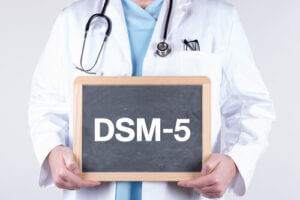PTSD and Substance Use Disorder: A Dual Diagnosis
Posttraumatic stress disorder (PTSD) and addiction are forms of mental illness that can occur together. Fortunately, both addiction and PTSD are treatable, and simultaneous recovery from these conditions is possible.1
This article will help you understand PTSD, the relationship between PTSD and addiction, and how you or your loved one can get help.
What Is Posttraumatic Stress Disorder?
PTSD is a psychiatric condition that some people may develop after witnessing or being exposed to a traumatic event. People with PTSD may feel extremely stressed or afraid even when they’re not in danger. Usually, but not always, symptoms of PTSD develop within 3 months of the trauma.3
To be diagnosed with PTSD, a person will experience symptoms that inhibit their ability to function in daily life for at least 1 month.3
What Causes PTSD?
 According to the Diagnostic and Statistical Manual of Mental Disorders (DSM-5), PTSD occurs when a person is exposed to a catastrophic, violent, or accidental event that involves a threat of death, severe injury, or sexual violation.4 This can include the person:4
According to the Diagnostic and Statistical Manual of Mental Disorders (DSM-5), PTSD occurs when a person is exposed to a catastrophic, violent, or accidental event that involves a threat of death, severe injury, or sexual violation.4 This can include the person:4
- Directly experiencing such an event (e.g., domestic violence, military combat).
- Witnessing it happen to someone else.
- Discovering that a family member or loved one has experienced such as event.
- Experiencing firsthand, repeated exposure to horrific events (e.g., as a first responder).
The result is that the person feels a great deal of distress about the event, to the degree that it impairs the person’s interpersonal relationships, ability to work or accomplish daily tasks, and other functional abilities.4
However, not everyone that experiences a traumatic event or works in a high-risk profession for PTSD will suffer from PTSD. Research has shown that genetics, history of substance use, gender, and additional factors play a role in why some people develop PTSD and others do not.3,4
What Are the Symptoms of PTSD?
Symptoms of PTSD may vary from person to person.4 The American Psychiatric Association’s Diagnostic and Statistical Manual of Mental Disorders (5th edition) (DSM-5) provides diagnostic criteria for PTSD. Symptoms of PTSD are grouped into the following 4 categories:4
- Re-experiencing or intrusion, which may include recurring and involuntary distressing memories or recurring dreams of the event, dissociative reactions which make the patient feel like they’re reliving the event, and significant or prolonged psychological distress or marked physiological distress when exposed to cues that remind them of the event.
- Avoidance, which may include avoiding memories, thoughts or feelings, people, places, conversations, activities, objects, or situations that remind them of the event.
- Arousal and reactivity, which may include irritability and angry outbursts (with little or no provocation) that can involve aggression toward people or things, reckless or self-destructive behavior, hypervigilance (i.e., always on guard), being quick to startle, the inability to concentrate, or having sleep troubles.
- Cognition and mood, which may include the inability to remember important things about the event, experiencing chronic and exaggerated beliefs about oneself, other people, or the whole world. PTSD may also cause chronic and ongoing distortions in thoughts about the event that cause misplaced blame, persistent negative emotional state, significant loss of interest in activities once participated in, feeling detached or estranged from others, or inability to experience positive feelings.
PTSD and Substance Abuse
 When PTSD and addiction occur together, it is referred to as a co-occurring disorder or dual diagnosis. There are several reasons why this is so prevalent:1,5
When PTSD and addiction occur together, it is referred to as a co-occurring disorder or dual diagnosis. There are several reasons why this is so prevalent:1,5
- People with PTSD may alcohol or drugs to help them manage their symptoms—a behavior referred to as self-medicating.
- A substance use disorder (SUD)—the clinical term for addiction—can also develop before someone experiences trauma and increase the risk of a person developing PTSD.
- PTSD and SUDs may both develop due to common risk factors.
Common risk factors that can increase a person’s risk of developing addiction and other mental illnesses include:5
- Genetics (family history of mental illness).
- Issues with certain regions of the brain and neurotransmitter systems (e.g., dopamine, serotonin, norepinephrine).
- Environmental factors, like exposure to trauma or stress at a young age.
- Epigenetics, which is the interaction between someone’s genes and their environment.
Risks of Substance Abuse for People with PTSD
People with PTSD who misuse substances have an increased risk of:1
- Chronic physical health problems.
- Deficient social functioning.
- Legal issues.
- Violence
- Suicide attempts.
Additionally, extreme stress caused by PTSD may contribute to substance-seeking behaviors.5 Chronic use of drugs or alcohol can, over time, lead to addiction.5
People with PTSD and co-occurring addiction often demonstrate poor treatment adherence, which can make it difficult—but not impossible—to instill changes that prevent relapse.1,5,6
How Common Is Co-Occurring Addiction and PTSD?
As mentioned above, co-occurring addiction and PTSD is common:1,2,7,8
- According to a 2021 epidemiologic study of people in the United States with PTSD, an estimated 46% had SUDs.2
- Studies of people with SUDs have reported rates of current PTSD of around 25-34%.2
- One report indicates that people with PTSD were 2 to 4 times more likely than people without PTSD to meet criteria for an SUD.1
- Exposure to interpersonal violence before age 11 has been associated with higher risk for lifetime use of all drug types and polysubstance use.7
- Women with PTSD are 4.46 times more likely, and men are 2.97 more likely, to meet criteria for drug dependence or misuse than those without PTSD.8
- Up to 75% of people who have survived abuse or violent trauma report drinking problems.9
- About a third of people who have survived severe illness, injury, or catastrophe report drinking problems.9
Recognizing Co-Occurring PTSD and Substance Use Disorder
A mental health professional will diagnose someone with PTSD if the person has experienced trauma and is demonstrating the symptoms and behaviors outlined in the DSM-5 for more than a month, and they interfere with the person’s functioning.3
Someone that continues to use drugs and alcohol despite experiencing serious consequences due to substance use may also have an addiction.10 Signs that indicate SUD include several physical, psychological, and social criteria that are outlined in the DSM-5 and can be found in our guide to addiction.
A mental health professional can diagnose both PTSD and substance use disorder. Since symptoms of co-occurring disorders can overlap, it’s important to receive a proper diagnosis. Dual diagnosis treatment may be able to help people effectively manage and recover from these disorders.11
Treatment Options for PTSD and Addiction
 Treating PTSD and addiction may require addressing both conditions at the same time, which is known as integrated treatment.5,11
Treating PTSD and addiction may require addressing both conditions at the same time, which is known as integrated treatment.5,11
Staff at Desert Hope are experienced and equipped to handle the treatment of both PTSD and addiction, utilizing evidence-based methods such as psychoeducation, behavioral therapy, peer support, and medication.
We also provide specialized addiction treatment programs, some of which include the:13
- Veteran and First Responders Addiction Treatment Program, which provides specialized care and support to veterans and first responders manage substance use disorders, high stress, and co-occurring disorders like depression and PTSD.
- Addiction Treatment Trauma Support Track, which offers trauma-focused therapies and counseling to treat trauma and addiction.
- LGBTQ+ Addiction Treatment Program. People in the LGBTQ+ community often experience stigma, harassment, and discrimination, and face increased risk of suffering from co-occurring disorders.
Through treatment for co-occurring addiction and PTSD, people can learn to manage the triggers and challenges of both PTSD and substance abuse and achieve recovery.5
Common Therapies Used to Treat PTSD and Substance Abuse
Various therapies are used to treat addiction and posttraumatic stress disorder, including:1,11,12,15,16
- Cognitive-behavioral therapy (CBT), which involves learning to change unhelpful or negative thoughts and behaviors.
- Family Behavior Therapy (FBT), which involves behavioral strategies to improve relationships and the home environment in order to support recovery.
- Prolonged Exposure (PE), which is a form of CBT designed for PTSD that has also been used to treat co-occurring PTSD and substance abuse. It involves gradually and safely re-expose the patient to traumatic memories, feelings, and situations.
- Seeking Safety, a non-exposure-based therapy that involves 24 sessions of therapy that focuses on establishing and maintaining feelings of safety through boundary setting, anticipation, anger management, and regulating moods, emotions, and reactions.
Medications Prescribed for PTSD and Addiction Treatment
Some, but not all, patients struggling with PTSD and SUDs require pharmacotherapy. It’s crucial that patients obey the guidelines for these medications given by their healthcare provider.
Antidepressants are often used to treat PTSD.17 This primarily include selective serotonin reuptake inhibitors (SSRIs) and serotonin-norepinephrine reuptake inhibitors (SNRIs), which may help you manage PTSD symptoms such as sadness, worry, anger, and numbness.3
Medications for SUD can vary by the substance misused. Typically, these medications either block the euphoric effects of substances, or normalize body functioning and mitigate cravings without causing the “high” associated with use of the drug.18
How to Find the Right Rehab for PTSD and Substance Abuse
Factors to consider when choosing a rehab can include:19,20
- Whether the facility provides individualized care, tailoring a treatment plan that addresses you or your loved one’s unique needs.
- Whether the facility is equipped to help people with co-occurring disorders.
- Whether the facility accepts you or your loved one’s insurance coverage, which can vary by plan. You can check your insurance coverage for addiction treatment at Desert Hope by filling out the confidential .
- The types of addiction care People with PTSD and substance use issues may benefit from a more intensive level of care (i.e., inpatient rehab vs. outpatient care).
- Amenities, which can vary by facility; some offer a basic approach while luxury facilities may provide a wide range of high-end amenities.
Paying for Treatment
Federal mandates say that most insurance plans must provide coverage for mental health and substance use treatment.21 However, the extent of this coverage depends on specific insurance policy.
If you lack insurance, or your coverage is insufficient to make treatment affordable, there are several other ways to pay for rehab (like financing or personal loans) that can make these costs manageable.
Recovery from addiction and PTSD is possible. Please reach out to an admissions navigator at and start the rehab admissions process at Desert Hope today.
Take your next step toward recovery:
✔ Learn more about our addiction treatment programs.
✔ See how popular insurance providers such as Humana or Carelon offer coverage for rehab.
✔ View photos of our facility.